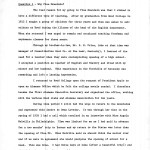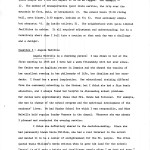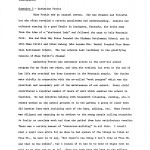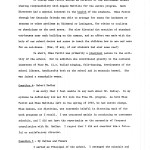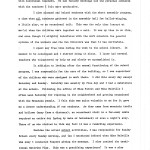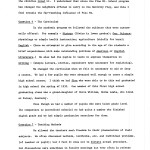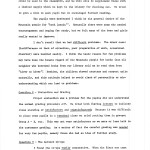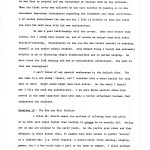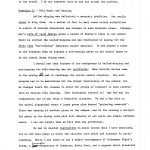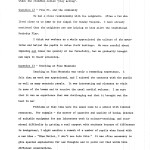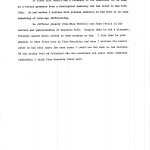Pine Mountain Settlement School
Series 01: HISTORIES
Series 09: BIOGRAPHY – Staff
Margaret Motter Writings
Recollections of Pine Mountain
1928-1938
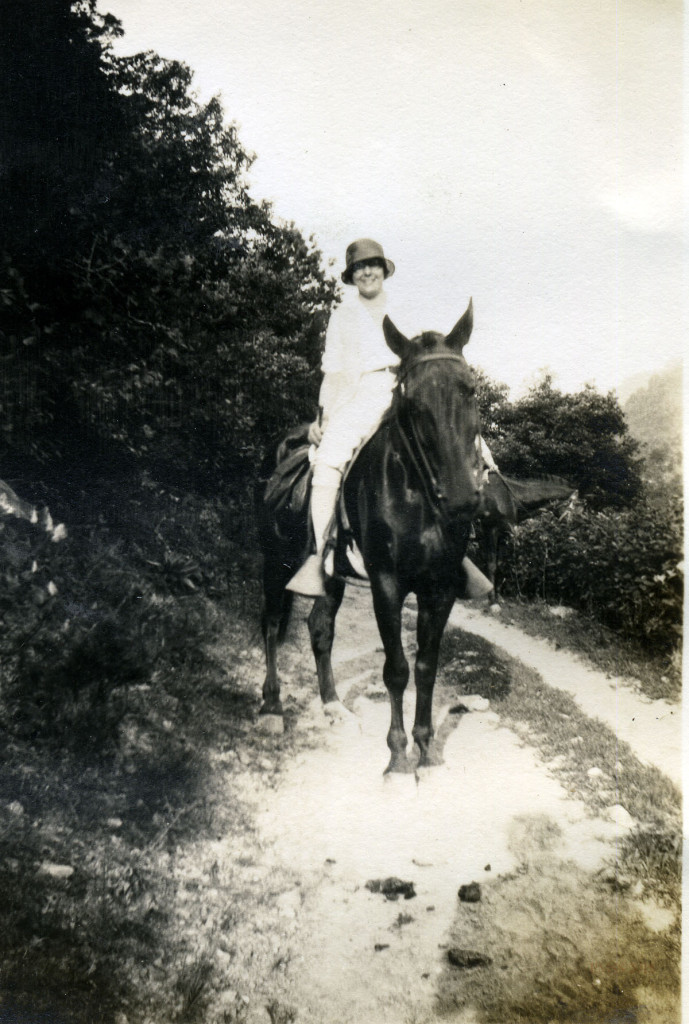
Margaret Motter. [kingman_086c.jpg]
TAGS: Margaret Motter, Recollections of Pine Mountain, Angela Melville, Katherine Pettit, Ethel de Long Zande, school principals, curriculum, grading and evaluations, Antioch College Co-ops at PMSS, folk music, dancing, community, teachers, Glyn Morris
MARGARET MOTTER WRITINGS Recollections of Pine Mountain, 1928-1938
CONTENTS
Question 1 – Why Pine Mountain? – pages 1-2
Question 2 – Angela Melville – pages 2-3
Question 3 – Katherine Pettit – pages 3-4
Question 4 – Hubert Hadley – page 4
Question 5 – My Duties and Power – pages 4-6
Question 6 – The Curriculum – page 6
Question 7 – Teaching Methods – pages 6-7
Question 8 – Evaluation and Grading – page 7
Question 9 – The Antioch Co-ops – pages 7-8
Question 10 – The Boy and Girl Problem – pages 8-9
Question 11 – Folk Music and Dancing – pages 9-10
Question 12 – Pine Mt. and the Community – page 10
Question 13 – Teaching at Pine Mountain – page 10
Question 14 – Glyn Morris – page 11
GALLERY: Recollections of Pine Mountain
- Motter, “Recollections,” pg. 1. [motter_D2_02010.jpg]
- Motter, “Recollections,” pg. 2. [motter_D2_02011.jpg]
- Motter, “Recollections,” pg. 3. [motter_D2_02012.jpg]
- Motter, “Recollections,” pg. 4. [motter_D2_02013.jpg]
- Motter, “Recollections,” pg. 5. [motter_D2_02014.jpg]
- Motter, “Recollections,” pg. 6. [motter_D2_02015.jpg]
- Motter, “Recollections,” pg. 7. [motter_D2_02016.jpg]
- Motter, “Recollections,” pg. 8. [motter_D2_02017.jpg]
- Motter, “Recollections,” pg. 9. [motter_D2_02018.jpg]
- Motter, “Recollections,” pg. 10. [motter_D2_02019.jpg]
- Motter, “Recollections,” pg. 11. [motter_D2_02020.jpg]
TRANSCRIPTION
[page 1]
RECOLLECTIONS OF PINE MOUNTAIN SETTLEMENT SCHOOL
Question 1 – Why Pine Mountain?
The real reason for my going to Pine Mountain was that I wished to have a different type of teaching. After my graduation from Hood College in 1913 I taught a group of children for three years and class was asked to substitute at Hood during the illness of the head of the English department. When she returned I was urged to remain and continue teaching freshman and sophomore classes for three years.
Through my brother-in-law, Mr. E.R. Price, (who at that time was manager of Consolidation Coal Co. at Van Lear, Kentucky), I learned of the need for a teacher when they were contemplating opening of a high school. I accepted a position as teacher of English and History and lived with my sister and her husband. This experience in the foothills of Kentucky was rewarding and left a lasting impression.
I returned to Hood College upon the request of President Apple to open an Alumnae Office which he felt the college sorely needed. I therefore became the first Alumnae Executive Secretary and organized the office, working with the various Hood clubs and Alumnae Association for two years.
During this period I still had the urge to return to the mountains and expressed this desire to Dean Lovejoy. It was through her that in the spring of 1928 I had a call which resulted in an interview with Miss Angela Melville in Philadelphia. Time was limited for me as I had paid in advance for a two months’ trip to Europe and my return to the States was later than the opening of Pine Mt. Miss Melville said we should think the matter over and if we were in agreement she would postpone the opening of school for a week. This was done. I had three days at home (after a beautiful trip!) and then I faced a completely new world.
[page 2] I had been told that life in that area and at the school was quite simple but I did not expect it to be so rugged. For example — 1.) The method of transportation (poor train service, the trip over the mountain by foot, mule, or horseback); 2.) The school hours (5:30 rising bell, noon dinner, 5:30 supper, bedtime at 9); 3.) Food extremely simple but adequate; 4.) No inside toilets, 5.) The neighborhood with quite limited facilities in cabins. It all required adjustment and understanding; but in a relatively short time I fell into a routine so that each day was a challenge and a delight.
Question 2 – Angela Melville
Angela Melville is a charming person! I was drawn to her at the first meeting in 1928 and I have had a warm friendship with her ever since. Her father was an Anglican rector in Jamaica and she showed the results of her excellent rearing in her philosophy of life, her idealism and her standards. I found her a great inspiration. Her educational training differed from the customary schooling in the States; but I think she had a fine basic education, and I always found her helpful in discussing school problems. Her duties were approximately those that Mrs. Zande had followed. For example, she was in charge of the school program and the spiritual development of the students’ lives. We had Sunday School for which I was responsible, and Miss Melville held regular Sunday Vespers in the chapel. Whenever she was absent I planned and conducted the evening service.
I think she definitely shared in the decision-making. Since she had personally known Uncle William, she had a real interest in the school and wanted it to be a center of enlightenment for the Mt. people. She often quoted Uncle William’s words written when he gave his land for the school: “Hopin’ it will make a bright and intelligent people after I am dead and gone.” [page 3] There was a spiritual quality about Angel Melville which was inescapable!
Question 3 – Katherine Pettit
Miss Pettit was an unusual person. She was dynamic and forceful but she often revealed a certain gentleness and understanding. Despite her cultured rearing in a good family in Lexington, Kentucky, she broke away from the idea of a “sheltered lady” and followed the urge to help Mountain folk. She and Miss May Stone founded the Hindman Settlement School; and in 1913 Miss Pettit and Ethel DeLong (who became Mrs. Zande) founded Pine Mountain Settlement School. The two schools bear testimony to the gratifying results of Miss Pettit’s dream!
Katherine Pettit was extremely active in the over-all school program for my first two years, and then she retired; but even to the end of her life she retained her deep interest in the Mountain people. Her duties were chiefly in connection with the so-called “work program” which was the practical and necessary part of the maintenance of our school. Every child contributed a required number of hours of work which enabled the school to function. We had children helping with housework (cleaning, cooking, etc.); others worked on the school grounds or in the garden; a group of older boys did heavier farm work including care of the barn, milking, etc. Miss Pettit was diligent and exacting as an adviser to the young people calling attention to faulty or careless work and thus she guided them into satisfactory results. There was a certain amount of “character-building” in all this. I recall what a pupil once wrote for me when he had spoken of the things he liked at Pine Mt., he went on the say, “But there’s one thing I don’t like at Pine Mt. and that is the milkin’, but I reckon if it has to be done it might just as well be me that has to do it.” When you know that the boys on the milking [page 4] crew got up at 4:30 A.M. you can catch the significance of that statement!
Of course Miss Pettit served as Director of the settlement school sharing responsibility with Angela Melville for the entire program. Both Directors had a special interest in the health of the students. Miss Pettit through her Kentucky friends was able to arrange for tests for hookworm or tracoma or other problems at Richmond or Lexington, for visits to oculist or physicians as the need arose. She also directed the erection of standard out-houses near each building on the campus, and an effort was made with the help of our school doctor and nurse to teach the children how to use and care for an out-house. (Few, if any, of our students had ever seen one!)
In short, Miss Pettit was primarily a practical person in the activity of the school. But in addition she contributed greatly to the cultural interests of Pine Mt. (i.e. ballad singing, folk-dancing, development of the school library, handicrafts both at the school and in mountain homes). She was indeed a remarkable woman.
Question 4 – Hubert Hadley
I am sorry that I feel unable to say much about Mr. Hadley….. As both Miss Pettit and Miss Melville left in the spring of 1930, he had entire charge. Miss Gaines [Ruth B. Gaines], our dietitian, was extremely helpful in directing much of the work programs as I recall. I was concerned mainly in continuing my customary schedule, and I did not have the opportunity or the necessity of frequent consultation with Mr. Hadley. ….
Question 5 – My Duties and Powers
I served as Principal of the school. I arranged the schedule and supervised the teaching program as well as teaching several classes in the [page 5] higher grades. I visited classes from time to time and discussed the work with individual teachers. We had faculty meetings but the personal contacts with the teachers I felt more productive.
I also planned and helped students with the short assembly program, a time when all students gathered in the assembly hall for ballad-singing, a little play, or an occasional talk. This was the only time (except at meals) when the children were together as a unit. It was my idea to do this, and even though it slightly interfered with the work schedule the general opinion of the workers and the two Directors was that it was worthwhile.
I spent any free time during the week in the school library. It needed to be catalogued and I started doing it alone. I later had several teachers who volunteered to help me and slowly we accomplished it.
In addition to looking after the normal functioning of the school program, I was responsible for the care of the building, so I was supervisor of the children who were assigned to work there. I did this every day except Saturday and Sunday. Saturday was usually my free day and I had a substitute at the school. Following the advice of Miss Pettit and Miss Melville I often used Saturday for visiting in the neighborhood and getting acquainted with the Mountain people. I felt this was quite valuable to me for it gave me a deeper understanding of our students. As they came from mountain trails and hollows (many from a distance), an occasional visit to a far-away cabin required an entire day (going by mule or horseback) or even a night’s stay. Those of us who visited in this way felt it was a rewarding experience.
Besides the actual school activities, I was responsible for Sunday School every Sunday morning, and (as I mentioned before) when Miss Melville was away I conducted Vespers giving the message. I also coached the traditional Nativity Play. This was gratifying experience! It was a play [page 6] arranged by Mrs. Zande (somewhat like the Morality plays of England) and the children loved it. I understand that since the Pine Mt. School program has changed the neighbors offered to carry on the Nativity Play, and this I feel reveals the far-reaching influence of Pine Mt.
Question 6 – The Curriculum
In the academic program we followed the subjects that were customarily offered. For example – History (Civics in the lower grades) ; Gen. Science; physiology or simple health instruction ; agriculture (chiefly for boys); English – (Here we attempted to give according to the age of the students a brief acquaintance with some outstanding portions of American or English Literature.) We also had the pupils to learn to express themselves in writing – (simple letters, stories, expository type necessary for explaining).
We changed the curriculum when we felt it necessary to add or drop a course. We had a few pupils who were advanced well enough to carry a simple high school course. I think we had five who were able to do this and graduated in high school in the spring of 1932. One member of this first high school graduating class was grand-daughter of Uncle William, Norma Lewis, who lived at Putney, Kentucky.
Even though we had a number of pupils who were below grade level (in comparison to accredited schools) we had quite a number who finished eighth grade and we had simple graduation exercises for them.
Question 7 – Teaching Methods
We allowed the teachers much freedom in their presentation of their subjects. We often discussed methods, textbooks, etc., and individual problems (or teacher or pupil) ; but I felt it wise not to dictate actual procedure. Our discussions were sometimes in faculty meetings but very often in private interview.
[page 7] Fortunately the school had a rather good supply of books which could be used in the classwork, and we were able to supplement these with a limited supply which we kept in the library for checking out. We tried to give a book to each pupil but we encouraged further reading.
The pupils were motivated I think by the general desire of the Mountain people for “book larnin”. Naturally there were some who needed encouragement and urging for study, but we felt many of the boys and girls really wanted to improve.
I don’t recall that we had difficult problems. The minor ones; (indifference or lack of attention, poor preparation of work, occasional disorder) were handled easily. I think the basic reason for few problems may have been the innate regard of the Mountain people for books (one old neighbor who borrowed books from our library told me he read them from “kiver to kiver”): Besides, the children showed courtesy and respect quite naturally, and this attitude helped to avoid clash of personality or mis-understanding which can lead to problems.
Question 8 – Evaluation and Grading
Proper evaluation was a problem, for the pupils did not understand the normal grading procedure A-F. We tried both having letters to indicate class standing or satisfactory and unsatisfactory. Because it was difficult to place some pupils in a standard class we tried putting them in groups: Group A – B, etc. This was not very satisfactory so we more or less held to the customary grading. As a matter of fact the careful grading was needed for very few pupils, namely those who had an idea of further study.
Question 9 – The Antioch [College] Co-ops
I found the co-ops really cooperative. When the first one came I gave him a thorough outline of our school program. I allowed him textbooks [page 8] library facilities, and explained how he could fit into our work. After this he was free to proceed and was encouraged to discuss with me any problems. When the first co-op was relieved he was very helpful in passing on to his successor important information regarding the classwork and other activities. I of course interviewed the new one but I felt it helpful to have the first one turn his work over with his own explanations.
We had a good relationship with the co-ops. Some were better than others, but I think they helped us, and of course we helped them with their practice-teaching. Occasionally we had one who was rather special in adapting himself to the entire school program. John Howard Young, I recall was extremely helpful to me in directing simple dramatizations and in ballad singing. He also loved the folk dancing and was an enthusiastic participant. His part in this was contagious!
I can’t think of any special weaknesses in the Antioch plan. The men came on a six weeks’ tenure, and I consider that a short period for this type of work. Eight weeks might have been better. On the whole I should say I felt the work was satisfactory. I am sure Berea seniors (when they served in the same capacity) must have made a better adjustment because they understood our students.
Question 10 – The Boy and Girl Problem
I think Mr. Morris meant the problem of allowing boys and girls to be with each other rather than keeping in groups as we usually did. Dating per se was not allowed in the early years. As the pupils grew older and they advanced in their school work, it seemed much more normal to permit “dating” in a limited way: i.e., after Vespers or a school party (folk dancing, singing, games, etc.) a boy could take a girl to her home on campus. I think perhaps [page 9] Mr. Morris may have recalled that the boy took a long time to walk his girl to her house! I do not remember that we had any actual sex problem.
Question 11 – Folk Music and Dancing
Ballad singing was definitely a mountain tradition. Our pupils loved to sing them. As a matter of fact in many cases ballad authorities in search of ballads discovered new stanzas in some mountain areas. Strangeway’s Life of Cecil Sharpe gives a record of Sharpe’s visit to our school where he enjoyed the ballad-singing and was fascinated by seeing for the first time “set- running” (mountain square dancing). It was always a treat to the students when we planned a set-running party at the school house or in the Laurel House dining room.
I should say that because of the background in ballad-singing and set-running the folk-dancing was not artificial. When Dorothy Bolles came in the spring we had to rearrange the entire school schedule. The work program had to be maintained for the proper functioning of the school; but we changed hours for classes in order for groups of students to have instruction in English folk dancing. They thoroughly enjoyed it! May Day was the culmination and it was truly a beautiful occasion. We had a May pole on the school playground where a large group also danced “Gathering Peascods”. There was dancing at another green on the campus, and in the evening a delightful party in the dining room with folk dancing of all sorts and simple refreshments. I can not recall that we felt this was artificial.
We had no special instruction in music except what I have mentioned, but we did have plays in which the children took pride and pleasure in participating. While I was there we had a simple arrangement of Midsummer Night’s Dream, dramatic adaptation of Hiawatha, Robin Hood, and a pageant which presented [page 10] the background and history of the school. We often dramatized ballads which the children called “play acting.”
Question 12 – Pine Mt. and the Community
We had a close relationship with the neighbors. Often a few who lived close to us came to our chapel for Sunday Vespers. I have already mentioned that the neighbors are now helping to keep alive the traditional Nativity Play.
I think our workers as a whole appreciated the culture of the mountains and helped the pupils to value their heritage. We were careful about imposing our ideas too quickly or too forcefully, but we gradually brought new ways to their attention.
Question 13 – Teaching at Pine Mountain
Teaching at Pine Mountain was truly a rewarding experience. I felt that my work was appreciated, and I enjoyed the contacts with the pupils as well as many mountain people. It was interesting and pleasant to visit in some of the homes and to receive the usual cordial welcome. I am sure that it was experience that was challenging and that it brought out the best in me!
Problems at that time were the usual ones in a school with limited resources. For example – the matter of quantity and quality of books; absence of suitable equipment for any laboratory work in science-teaching; and occasional difficulty in getting a real rapport with students because of differences in background. I might mention a remark of a number of pupils when faced with a new idea — “Miss Motter, I don’t see into this.” It was often necessary to give special explanation for new thoughts and to point out that words have different connotations.
[page 11] Question 14 – Glyn Morris
At first Glyn Morris was a stranger to the mountains for he came as a recent graduate from a theological seminary and had lived in New York City. He had worked I believe with problem children in New York so he knew something of teen-age difficulties.
He differed greatly from Miss Melville and Miss Pettit in his outlook and understanding of mountain folk. Despite this he had a pleasant, friendly manner which served to draw persons to him. I felt that he grew greatly in that first year at Pine Mountain, and when I visited the school after he had been there for some years I could see how much he had matured. He had Arthur Dodd as Principal who was excellent and under their combined leadership I think Pine Mountain fared well.
See Also:
MARGARET MOTTER Staff Biography
Return To:
MARGARET MOTTER COLLECTION Guide

